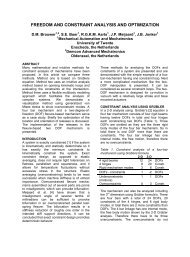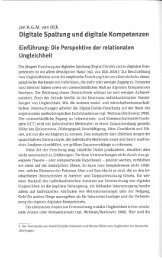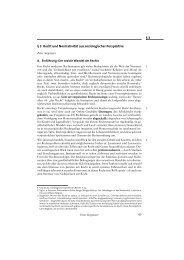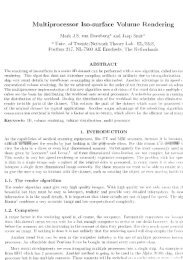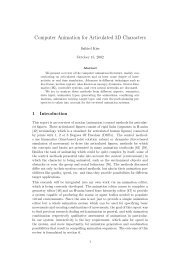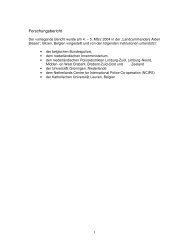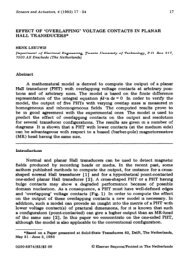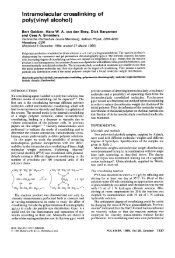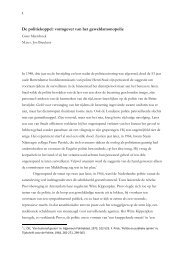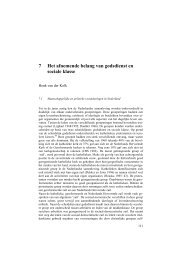Innovation and institutional change: the transition to a sustainable ...
Innovation and institutional change: the transition to a sustainable ...
Innovation and institutional change: the transition to a sustainable ...
Create successful ePaper yourself
Turn your PDF publications into a flip-book with our unique Google optimized e-Paper software.
152 Chapter 5<br />
provides an overview of major policy miles<strong>to</strong>nes <strong>and</strong> o<strong>the</strong>r developments<br />
affecting <strong>the</strong> course of cogeneration in <strong>the</strong> period 1998-2005.<br />
Basic rules for cogeneration <strong>change</strong> with <strong>the</strong> introduction of <strong>the</strong> 1998<br />
Electricity Act<br />
The 1998 Electricity Act significantly <strong>change</strong>d <strong>the</strong> national regulation of <strong>the</strong><br />
electricity system. Restrictions on power generation disappeared <strong>and</strong><br />
electricity trade <strong>and</strong> supply adopted <strong>the</strong> competitive model. The <strong>change</strong>s also<br />
ended <strong>the</strong> special position of decentral cogeneration in <strong>the</strong> Dutch electricity<br />
system. The application of preferential gas prices for cogeneration was<br />
terminated. Remuneration tariffs for larger cogeneration units had <strong>to</strong> be<br />
negotiated in a competitive setting. Cogeneration capacity units of less than<br />
2 MWe still benefited from existing remuneration schemes until 2002.<br />
Special regulations for all o<strong>the</strong>r cogeneration installations were ended. From<br />
1998 on cogeneration based au<strong>to</strong>-producers were submitted <strong>to</strong> <strong>the</strong> general<br />
transmission <strong>and</strong> transport tariffs in <strong>the</strong> Dutch electricity market. These<br />
tariffs turned out <strong>to</strong> be ra<strong>the</strong>r disadvantageous for cogeneration, <strong>and</strong> interest<br />
organisations of au<strong>to</strong>-producers tried <strong>to</strong> <strong>change</strong> <strong>the</strong> tariff treatment of<br />
decentral cogeneration capacity, but without success 31 . The Dutch<br />
government acknowledged liberalization could harm <strong>the</strong> fur<strong>the</strong>r penetration<br />
of cogeneration in <strong>the</strong> Ne<strong>the</strong>rl<strong>and</strong>s, but argued that EU-regulation on fair<br />
competition no longer allowed for special treatment of cogeneration in<br />
electricity trade <strong>and</strong> supply. Instead, <strong>the</strong> government used <strong>the</strong> tariff of <strong>the</strong><br />
energy tax <strong>to</strong> fur<strong>the</strong>r support cogeneration (charging au<strong>to</strong>-produced<br />
electricity <strong>to</strong> satisfy own dem<strong>and</strong>s for half <strong>the</strong> tax tariff) <strong>and</strong> extended <strong>the</strong><br />
fiscal support program for tax deduction of energy investments. Imports rose<br />
strongly due <strong>to</strong> <strong>the</strong> process of liberalisation of <strong>the</strong> Dutch electricity market<br />
<strong>and</strong> negatively affected competitiveness of cogeneration. In period 1989-<br />
1999 electricity prices were mainly determined by gas prices as <strong>the</strong> Dutch<br />
park of power plants utilised gas as its main resource, <strong>and</strong> <strong>change</strong>s in gas<br />
price had no major effect on profitability of cogeneration. This <strong>change</strong>d due<br />
<strong>to</strong> liberalisation as rising imports led <strong>to</strong> a much stronger influence of nuclear<br />
<strong>and</strong> coal-fired power on <strong>the</strong> electricity price, especially in off-peak periods.<br />
In combination with rising gas prices (<strong>and</strong> continuously low coal prices) this<br />
led <strong>to</strong> a deterioration of <strong>the</strong> market position of cogeneration.<br />
31 Tariff codes fatal for cogeneration (in Dutch), Energietechniek, 10 (77), 1999: 514.



